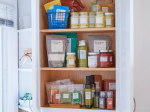Facebook/Brandless
- A new wave of online retailers is cropping up.
- Brandless and Public Goods, for example, promise own-brand convenience and pricing and a highly curated selection for customers.
- That stands in stark contrast to e-commerce giants like Amazon, which offers a wide variety of products that are primarily found through search.
- Both Brandless and Public Goods have experienced some success, but it's unclear how much runway they have.
Right now, most online shops are built as platforms for searching.
Shoppers looking for a wide range of items — spatulas, paper towels, dog treats, or pasta, for example — will see a wall of results ordered according to a secret algorithm and, in many cases, ad sales.
"What we hear a lot is that there's what we call the Paradox of Choice," Brandless founder and CEO Tina Sharkey told Business Insider during a recent interview. "The idea that people are sort of standing in front of the aisles or on a website that carries everything, and they don't even know where to start."
"It just becomes like a wallpaper of stuff," she added.
Instead of offering multiple choices, Brandless offers one own-brand choice. One kind of spatula, one kind of paper towels, four flavors of the same kind of dog treats, and two buckets of pasta: organic or gluten-free. Brandless also has a serious focus on natural, organic, healthy, and sustainable goods — or what the website calls "values."
"Part of the Brandless value proposition is that we do the curating for you," Sharkey said.
Brandless isn't the only one tapping into this niche.
Public Goods, a smaller and younger company, has a similar value proposition of selling own-brand goods online, with a similar focus on curation. Its founder and CEO Morgan Hirsh told Business Insider in a recent interview that online shopping has "devolved to a place where there was choice without benefits."
"Some categories [of items] reach a stage where there's so many players that it sort of stops adding any benefit to the consumer," Hirsh said. "So you end up in a situation like Amazon, where you type in 'soap' and end up being served up 30,000 different options. Of course, nobody is going to go through 30,000 different options."
"I wanted to build one brand people could trust so that they wouldn't need to sift through 1,000 options, but just have one good option that they could trust in each category," he said.
Public Goods has an added wrinkle of a $59-a-year membership shoppers need to buy to access these goods, but it has a similar focus on "quality" goods, which for Hirsh means "healthy for people and healthy for the planet."
Both brands are growing. A year after launch, Brandless got a major $240 million shot in the arm in a funding round led by Softbank, which valued the company at more than $500 million.
"We're tapping into a nerve of this idea of democratizing access to goodness," Sharkey said.
Brandless now sells around 500 items, according to Sharkey, who predicts they will sell 800 by the end of the year.
Public Goods is younger, but Hirsh says indications and sales have been strong so far.
"80% of people who try us repeat," he noted.
Have these startups found a niche in the shadow of the everything store?
"These companies definitely have opportunity," Sucharita Kodali, principal analyst at Forrester, told Business Insider. "Consumers love to try new brands, and if there are companies that offer great new products with cool packaging and an interesting story, lots of shoppers, especially young people, will try them."
But there may be a limit to these companies' success, as Kodali notes that "the challenge is that these businesses are never big."
And there may be danger lying around the corner if the beast is awoken.
"Because they're not big, Amazon may try it out," Kodali said. "And we don't know how much longer shoppers will think this type of thing is new."
Right now, these online stores are new and exciting. Soon, they won't be so new anymore.
"If people have seen something before, they're less likely to find it interesting," Kodali said.
See Also:















